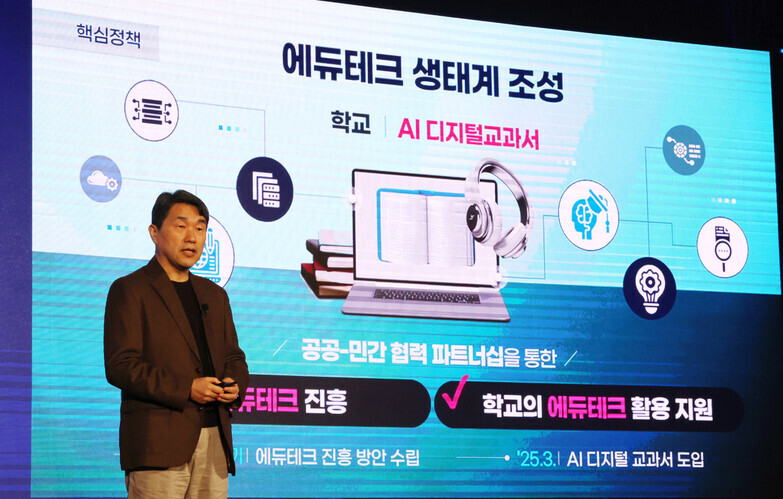hankyoreh
Links to other country sites 다른 나라 사이트 링크
Korea to adopt AI textbooks for core subjects starting in 2025

Beginning in 2025, math, English and IT will be taught with digital textbooks enhanced with artificial intelligence (AI) at Korean elementary, middle and high schools.
The initiative is part of a plan for “digital-based education innovation” announced at the Seoul government complex on Thursday by Education Minister Lee Ju-ho, who also serves as Korea’s deputy minister for social affairs.
The AI-powered digital textbooks mentioned in the initiative would be more than digitized versions of standard textbooks — the Education Ministry plans to equip them with the latest technology, including a smart tutoring system, metaverse capabilities and conversational AI.
The ministry intends to adopt the digital textbooks in three stages, beginning with new curriculum for the third and fourth grades of elementary school and the first grade of middle school and required courses and general electives in high school in 2025. The program will be extended to the fifth and sixth grades of elementary school and the second grade of middle school in 2026 and then to the third grade of middle school in 2027.
The ministry has already confirmed that the digital textbooks will be used for the subjects of math, English and IT. The finalized list of subjects is expected to be announced in May.
One option being considered by the Education Ministry is to use the digital textbooks alongside standard books for three years so as to minimize confusion in the classroom and then to fully transition in 2028, taking into account program results and teachers’ opinions.
The ministry explained that adopting AI-powered digital textbooks will enable students to participate in a greater variety of classes, including project-based learning and discussions with the teacher about information gleaned from the textbook. The ministry also believes that teachers can use AI to tailor their classes to students’ characteristics through real-time collection and analysis of data about student learning.
The Education Ministry plans to set up a pilot program of 400 teachers this year that can be expanded to 1,500 by 2025 for use in teacher training. In addition, the ministry will select seven municipal and provincial offices of education and have each designate and operate around 40 “digital pilot schools” (with 300 altogether).
The pilot schools will be encouraged to use already developed “edutech” programs and to apply new pedagogical methods not only in the regular curriculum but also in various afterschool programs.
By Lee You-jin, staff reporter
Please direct questions or comments to [english@hani.co.kr]

Editorial・opinion
![[Column] Park Geun-hye déjà vu in Yoon Suk-yeol [Column] Park Geun-hye déjà vu in Yoon Suk-yeol](https://flexible.img.hani.co.kr/flexible/normal/500/300/imgdb/original/2024/0424/651713945113788.jpg) [Column] Park Geun-hye déjà vu in Yoon Suk-yeol
[Column] Park Geun-hye déjà vu in Yoon Suk-yeol![[Editorial] New weight of N. Korea’s nuclear threats makes dialogue all the more urgent [Editorial] New weight of N. Korea’s nuclear threats makes dialogue all the more urgent](https://flexible.img.hani.co.kr/flexible/normal/500/300/imgdb/original/2024/0424/7317139454662664.jpg) [Editorial] New weight of N. Korea’s nuclear threats makes dialogue all the more urgent
[Editorial] New weight of N. Korea’s nuclear threats makes dialogue all the more urgent- [Guest essay] The real reason Korea’s new right wants to dub Rhee a founding father
- [Column] ‘Choson’: Is it time we start referring to N. Korea in its own terms?
- [Editorial] Japan’s rewriting of history with Korea has gone too far
- [Column] The president’s questionable capacity for dialogue
- [Column] Are chaebol firms just pizza pies for families to divvy up as they please?
- [Column] Has Korea, too, crossed the Rubicon on China?
- [Correspondent’s column] In Japan’s alliance with US, echoes of its past alliances with UK
- [Editorial] Does Yoon think the Korean public is wrong?
Most viewed articles
- 1[Column] Park Geun-hye déjà vu in Yoon Suk-yeol
- 2Will NewJeans end up collateral damage in internal feud at K-pop juggernaut Hybe?
- 3Thursday to mark start of resignations by senior doctors amid standoff with government
- 4Why Korea shouldn’t welcome Japan’s newly beefed up defense cooperation with US
- 5‘We must say no’: Seoul defense chief on Korean, USFK involvement in hypothetical Taiwan crisis
- 6[Guest essay] The real reason Korea’s new right wants to dub Rhee a founding father
- 7N. Korean hackers breached 10 defense contractors in South for months, police say
- 8[Column] ‘Choson’: Is it time we start referring to N. Korea in its own terms?
- 9[Editorial] New weight of N. Korea’s nuclear threats makes dialogue all the more urgent
- 10Kim Jong-un expressed ‘satisfaction’ with nuclear counterstrike drill directed at South